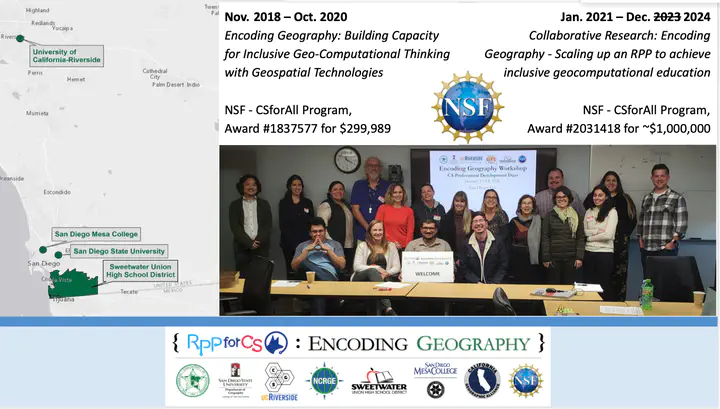Encoding Geography

The geospatial services industry is a profitable and rapidly growing field; however, employers find it difficult to hire scientists with expertise in both geography and computer science. The limited availability of training opportunities in both computer science and geography has created a shortage of workers with the necessary knowledge and skill sets for those jobs. Through a Researcher-Practitioner Partnership (RPP), The Association of American Geographers (AAG), in collaboration with Texas State University, the University of California-Riverside, San Diego State University, the California Geographic Alliance, Sweetwater Union High School District, and San Diego Mesa College, will create an inclusive high school to college curriculum pathway that bridges concepts in computer science and geography. This RPP will support the development of a curriculum that is conceptually rigorous, inclusive, and culturally relevant. It will also produce a replicable approach for teaching geocomputation that is accessible and motivational for all learners.
The Association of American Geographers (AAG), in collaboration with Texas State University, the University of California-Riverside, San Diego State University, the California Geographic Alliance, Sweetwater Union High School District, and San Diego Mesa College, proposes a CSforALL-PreK-14 Pathways Strand project to scale up its Encoding Geography Researcher-Practitioner Partnership (RPP) activities in California. This RPP will pursue research and development activities supporting an inclusive curriculum pathway toward geocomputationally intensive majors and careers. The first year of the project will focus on baseline data collection. In year two, AAG will convene a workshop with RPP members to produce culturally relevant geocomputational lessons and being to implement those lesson in CS and geography courses in high school and college. In the final year, the RPP will revise the lessons for ongoing implementation. The AAG will also implement a dissemination plan to scale up the RPP across California and to other states. An expert committee will provide a formative and summative evaluation of the project. This RPP will produce a replicable methodology for articulating curriculum pathways in geocomputation that are inclusive, accessible, and motivational for all learners. By involving the very stakeholders with whom the curriculum is concerned, systemic change toward a more diverse workforce in geocomputation is more likely to be achieved.
See more on the funder’s website